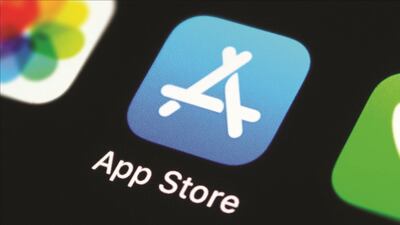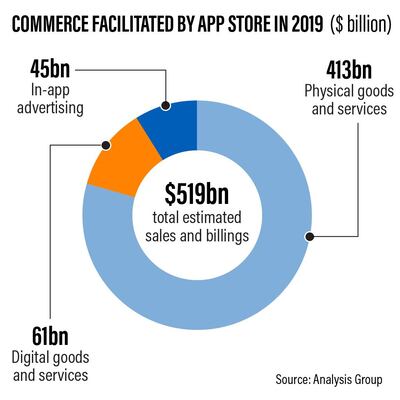Sales worth $519 billion (Dh1.9 trillion) were facilitated through Apple's App store last year, the US technology company said, citing the findings of a new study.
Physical goods and services accounted for the biggest share – nearly 80 per cent of the total sales at $413bn, economic consulting firm Analysis Group revealed in a study supported by Apple.
“In a challenging and unsettled time, the App Store provides enduring opportunities for entrepreneurship, health and well-being, education and job creation … helping people adapt quickly to a changing world,” Tim Cook, Apple’s chief executive, said on Monday.
“We are committed to doing even more to support and nurture the global App Store community, as it continues to foster innovation, create jobs and propel economic growth for the future.”
The amounts cited include app purchases, physical and digital goods and services bought through apps, as well as items bought through other channels, such as a video streaming services, that are principally consumed through apps. However, it also subtracts billings from in-app purchases made through the App store that are principally used elsewhere.
The physical goods and services purchased included $268bn of general retail goods, $57bn of travel services, $40bn in ride-hailing purchases, $31bn of food deliveries and $14bn of groceries. These were bought either through company-owned apps or virtual marketplaces.
Digital goods and services, from which Apple takes up to 15 to 30 per cent commission, generated $61bn. These include apps for music and video streaming, fitness, education, e-books, audiobooks, news and magazines, among others.
In-app advertising sales accounted for $45bn – $20bn of which came from games. Non-gaming apps that generate substantial in-app advertising sales are often free to download and use, such as Twitter and Pinterest.
More than 85 per cent of the App Store sales went to third parties, Apple said.
“Apple only receives a commission from the billings associated with digital goods and services … more than 85 per cent of the $519bn accrues solely to third-party developers and businesses of all sizes,” the company said.
An app store is a digital distribution platform for mobile apps. Industry experts say the number of mobile app downloads will continue to grow in the coming years.
More than 205 billion apps across all platforms were downloaded in 2018 and this number is predicted to reach almost 260 billion in 2022, according to research company Statista.
Launched in 2008, the App Store is home to almost 2 million apps and is visited by half a billion people each week across 175 countries.
Apple is set to hold its annual Worldwide Developer Conference (WWDC) next Monday, with this year's event taking place virtually. The Cupertino-based company typically announces new updates of its operating systems to developers at the event.
Apple is also under increasing regulatory scrutiny over the operation of the App Store, with lawmakers questioning the various business practices of the App Store.
The company has repeatedly said it is a “flourishing economy” that is helping millions of developers globally.
“The results [of the study] encapsulate the full sweep of the dynamic, competitive, and flourishing app economy, which has unleashed a torrent of innovation and revolutionised the way the world learns, works and connects,” Apple said.



